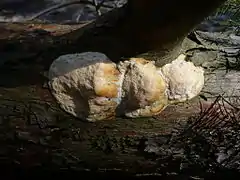Diplomitoporus flavescens
Diplomitoporus flavescens is a species of poroid crust fungus in the family Polyporaceae.
| Diplomitoporus flavescens | |
|---|---|
 | |
| Scientific classification | |
| Kingdom: | |
| Division: | |
| Class: | |
| Order: | |
| Family: | |
| Genus: | |
| Species: | D. flavescens |
| Binomial name | |
| Diplomitoporus flavescens (Bres.) Domański (1970) | |
| Synonyms[1] | |
Taxonomy
It was first described by Italian mycologist Giacomo Bresadola in 1903 as Trametes flavescens.[6] Stanislaw Domański made it the type species of his newly created genus Diplomitoporus in 1970.[7]
Habitat and distribution
Diplomitoporus flavescens has a circumpolar distribution that extends to eastern Canada.[8] The fungus is rare in Northern Europe, where it is restricted to old-growth forests that are dominated by spruce trees. In this region it tends to prefer host trees that have no or few other fungi growing on it, and that have fallen in a relatively healthy state.[9] The fungus has also been recorded in the polypore-biodiverse Changbaishan region in northeastern China.[10] In 2016, D. flavescens was reported for the first time in Turkey, where it was found growing on a branch of black pine.[11]
References
- "GSD Species Synonymy: Diplomitoporus flavescens (Bres.) Domański". Species Fungorum. Kew Mycology. Missing or empty
|url=(help) - Bondartsev, A.; Singer, R. (1941). "Zur Systematik der Polyporaceae". Annales Mycologici (in German). 39 (1): 43–65.
- Aoshima, K. (1967). "Synopsis of the genus Daedalea Pers. ex Fr". Transactions of the Mycological Society of Japan. 8: 1–4.
- Ryvarden, L. (1973). "Some genera of resupinate polypores". Norwegian Journal of Botany. 20 (1): 7–11.
- Zmitrovich, I.V. (2001). "Some new combinations in Polyporaceae: sapienti sat". Mycena. 1 (1): 91–93.
- Bresadola, G. (1903). "Fungi Polonici a cl. Viro B. Eichler lecti". Annales Mycologici (in Latin). 1 (1): 65–96.
- Domański, S. (1970). "Wood-inhabiting fungi of Bialowieza virgin forests in Poland. XIII. Two species of Diplomitoporus Doman., gen. nov". Acta Societatis Botanicorum Poloniae. 39 (1): 191–207. doi:10.5586/asbp.1970.016.
- Ryvarden, Leif; Melo, Ireneia (2014). Poroid Fungi of Europe. Synopsis Fungorum. 31. Oslo, Norway: Fungiflora. p. 174. ISBN 978-8290724462.
- Renvall, Pertti; Renvall, Tarja; Niemala, Tuovo (1991). "Basidiomycetes at the timberline in Lapland 2. An annotated checklist of the polypores of northeastern Finland" (PDF). Karstenia. 31: 13–28. doi:10.29203/ka.1991.282.
- Dai, Y. (2003). "[Rare and threatened polypores in the ecosystem of Changbaishan Nature Reserve of northeastern China]". Ying Yong Sheng Tai Xue Bao = the Journal of Applied Ecology. 14 (6): 1015–1018.
- Doğan, Hasan Hüseyin; Kurt, Fevzi (2016). "New macrofungi records from Turkey and macrofungal diversity of Pozantı-Adana". Turkish Journal of Botany. 40: 209–217. doi:10.3906/bot-1501-22.